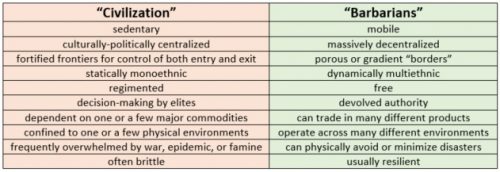Crony Capitalism
I Am a Barbarian
Scott, James C. Against the Grain: A Deep History of the Earliest States. New Haven: Yale University Press, 2017.
Scott has hit another metaphorical grand slam with this one, a worthily disconcerting follow-on to his earlier work. I have previously read (in order of publication, rather than the order in which I encountered them) The Moral Economy of the Peasant, Seeing Like a State, and Two Cheers for Anarchism, and found them congenial. Scott is particularly good at encouraging a non-elite viewpoint deeply skeptical of State power, and in Against the Grain he applies this to the earliest civilizations. Turns out they loom large in our imagination due to the a posteriori distribution of monumental ruins and written records—structures that were often built by slaves and records created almost entirely to facilitate heavy taxation and conscription. Outside of “civilization” were the “barbarians,” who turn out to have simply been those who evaded control by the North Koreas and Venezuelas of their time, rather than the untutored and truculent caricatures of the “civilized” histories.

By these criteria, the United States of America is predominately a barbarian nation. In the order given above:
“Eagle deaths: an interesting contrast”
Via David Hardy:
Synopsis: The use of lead hunting ammunition apparently kills a small number of eagles annually while wind turbines kill large numbers of birds of many types. Public officials who are concerned about bird deaths by lead poisoning tend not to be concerned about bird deaths by wind turbine.
Much as Islam trumps sexual orientation in identity politics, so crony-capitalist green energy schemes trump the welfare of wild animal populations in eco politics.
Dodd-Frank, Obamacare grew out of same faulty reasoning
The current partisan war over the Dodd-Frank Act is just one dispute in a broader ideological divide about the government’s role in industry. This dispute, which has deep historical roots, includes a similar battle over Obamacare. The common disagreement at issue with both laws — now in the cross hairs of a GOP-controlled Washington — is the extent to which politicians should subsidize their constituents indirectly through regulation of private companies.
The Affordable Care Act governing health insurers was about 1,000 pages, and Dodd-Frank governing most other financial institutions was more than twice that. Both stopped short of nationalizing their respective industry, instead generating more than 10 pages of regulation for every one page of legislation, although many view nationalization as an eventual but inevitable consequence, particularly for health care.
The distinction between public control and public ownership is the primary distinction between the competing mid-20th-century ideologies of fascism and communism. In contemporary terminology, this distinction is between crony capitalism and nationalization, neither of which can be reconciled with competition and freedom of choice.
Dominic Cummings: How the Brexit Referendum was Won

Dominic Cummings explains how the Brexit referendum was won. Cummings was the Campaign Director of Vote Leave. He was in effect the executive director of the Brexit referendum campaign. This article explains how it happened. It is also long and rambling. But read it all anyway.
It is full of many interesting observations and various insightful, epigrammatic comments:
Most of the MPs we dealt with were not highly motivated to win and lacked extreme focus, even those who had been boring everybody about this for decades. They sort of wanted to win but they had other priorities. …
This lack of motivation is connected to another important psychology the willingness to fail conventionally. Most people in politics are, whether they know it or not, much more comfortable with failing conventionally than risking the social stigma of behaving unconventionally. They did not mind losing so much as being embarrassed, as standing out from the crowd. (The same phenomenon explains why the vast majority of active fund management destroys wealth and nobody learns from this fact repeated every year.)
This happens all the time, not just in politics.